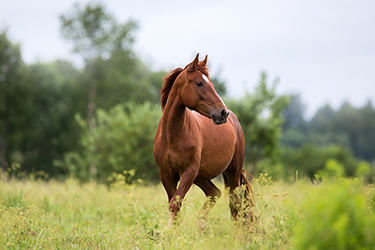PPID and Caring for Geriatric Horses

Horses are living longer, and many will live to be 25-30 years old. There are four main factors to keep in mind when it comes to caring for older horses: disease, decreased nutrient absorption, environmental and herd stress, and poor dental hygiene.
But, there’s a condition all horse owners should be aware of long before horses are considered geriatric.
What is equine Pituitary Pars Intermedia Dysfunction?
Pituitary Pars Intermedia Dysfunction is also known as Equine Cushing’s disease, and is a dysfunction of the pituitary gland in horses. Taking its name from the Pars Intermedia, or middle lobe of the pituitary gland, PPID results in overproduction of hormones and loss of function.
Cushing’s is one of the most common illnesses in older horses, and physical signs can include the following:
- A long, curly hair coat that doesn’t shed properly (also known as hirsutism)
- Decreased athletic performance
- Excessive drinking and urination
- Excessive sweating
- Laminitis
- Lethargy
- Infertility
- Muscle loss
- Neurologic deficit/blindness
Severity of clinical signs will depend on the stage of the disease. Horses suffering from PPID may also be insulin resistant. These horses will suffer from abnormal fat distribution, muscle loss and increased susceptibility to disease among other symptoms.
How can you diagnose PPID in horses?
Before testing a horse for PPID, it’s important to know that the best indication of the disease is the clinical sign of hirsutism in an older horse.
Pituitary Pars Intermedia Dysfunction isn’t quite as easy to diagnose as we’d like, but there are two popular tests veterinarians can use: the Dexamethasone suppression test, and the measurement of resting plasma ACTH concentration.
The dexamethasone suppression test is the most reliable, and works by suppressing cortisol after administering a dose of dexamethasone. In horses with PPID, the dexamethasone should not have a negative effect on serum cortisol production.
With ACTH concentration, the test is simpler and doesn’t involve the administration of dexamethasone to the horse. This test is widely known as a confirmatory test for PPID. In order to achieve the most accurate results possible, the sample used must be handled properly.
It’s important to note that no test is 100 percent accurate, and both tests can result in false positives if carried out during fall months.
How to Predict if a horse is more susceptible to PPID
Pituitary Pars Intermedia Dysfunction mostly affects horses over the age of 15, but can be present in some as young as seven years old. Screening tests are helpful for ruling out whether a horse might have PPID, but it’s not quite accurate enough to fully diagnose whether the horse actually has the disease.
Screening tests include the measurement of fasting serum insulin concentration, and the cortisol circadian rhythm test. Regardless of which screening test used, additional testing is necessary to confirm whether the horse has PPID.
How to treat a horse with PPID
Unfortunately, PPID is a condition that typically is never fully resolved. The best thing anyone can do for a horse with the disease is make their life as comfortable as possible. Thankfully, there are a number of ways to do so.
To treat a horse with PPID, improve their quality of life, and hopefully extend the length of their life, the owner can do the following:
- Administer the drug of choice, Pergoglide, to treat the disease
- Keep up with dental care
- Clip any unnecessary hair
- Regularly deworm the horse
- Trim and balance the horse’s hooves
It’s possible that a horse with PPID can be insulin resistant, so depending on the individual diagnosis, the horse may need to be placed on a special diet. Avoiding foods high in sugar and starch can help make the horse’s life more comfortable.
The earlier you can diagnose the horse, the better. Recognizing symptoms early on can help the horse to live a higher quality, longer life.
Covetrus has a comprehensive set of integrated services and technology solutions for veterinary practices. Contact your sales representative at 855-724-3461 or reach out online to learn more.
Sources:
- https://ker.com/equinews/taking-care-of-the-senior-horse/
- https://aaep.org/horsehealth/equine-cushings-disease-equine-pituitary-pars-intermedia-dysfunction
- https://www.smartpakequine.com/content/cushings-disease-horse
Need Regulatory Assistance
If you need help with regulatory or licensing issues, we're happy to help. We have a wide variety of resources to help you when issues arise.

Careers
Are you looking for a place to let your talents shine? At Covetrus, we help our practitioner customers better serve their patients and take pride in providing the best customer experience possible. Search our open positions to see our available opportunities.
Newsletter
Stay current with what’s going on with Covetrus, subscribe to receive our newsletter and email communications. Subscribers will receive the latest information in practice management, sales and marketing, animal health, and more.


Leave a comment